Uncategorized
Crypto Daybook Americas: Ether Outshines Bitcoin Ahead of CPI; Traders Eye ‘Altcoin ETF Summer’

By Francisco Rodrigues (All times ET unless indicated otherwise)
Bitcoin (BTC) briefly rose past $110,000 after headlines out of London pointed to progress in U.S.-China trade negotiations. It’s now dropped back to remain little changed over 24 hours while the CoinDesk 20 (CD20) index rose 2%, suggesting a rotation into altcoins.
One factor keeping bitcoin at bay and the preference for altcoins might be that the agreement out of London remains tentative, still needing sign-off from both Presidents Donald Trump and Xi Jinping.
In traditional markets, the reaction was also mixed. Asian equities rose, with the Hang Seng index adding 0.8%, European stock indexes gained less than 0.2% and U.S. index futures pointed down.
“There’ve been several twists and turns already, and markets are getting fairly used to this uncertainty by now,” Deutsche Bank strategist Jim Reid said.
Meantime, investors are preparing for a fresh batch of inflation data. The U.S. Consumer Price Index (CPI) report due later today is expected to show a 0.3% increase in core inflation for May, with annual core inflation rising to 2.9%. Producer price data, which will follow tomorrow, is also forecast to climb.
Among altcoins, ether (ETH) is showing quieter but potentially more meaningful strength. Options markets suggest traders are positioning for upside, with front-end volatility spiking and call options gaining favor, according to analysts at hedge fund QCP Capital.
Add to that the $450 million in ether ETF inflows logged so far this month, and there’s a suggestion of growing investor appetite. The shift is underpinned by the Ethereum blockchain’s expanding role as infrastructure for tokenized real-world assets.
“Looking ahead, macro tailwinds are aligning for ETH,» the QCP Capital analysts wrote. «With the GENIUS Act advancing in the U.S. Senate, Circle’s IPO discussions resurfacing, and stablecoins gaining regulatory traction, Ethereum’s native role in tokenization and settlement rails may be primed for outsized structural upside.”
Nevertheless, the CPI report is likely to dominate the conversation. A hotter-than-expected reading could reinforce concerns that inflation may remain sticky into the coming months, reducing the chance of a Fed interest-rate cut and potentially prompting a renewed run for hedges like gold.
If the data comes in cooler, it could open the door for risk assets, including crypto, to extend their gains. Stay alert!
What to Watch
- Crypto
- June 11, 7 a.m.: Stratis (STRAX) activates mainnet hard fork at block 2,587,200 to enable the Masternode Staking protocol.
- June 12, 10 a.m.: Coinbase’s State of Crypto Summit 2025 (New York). Livestream link.
- June 16: 21Shares executes a 3-for-1 share split for ARK 21Shares Bitcoin ETF (ARKB); ticker and NAV remain unchanged.
- June 16: Brazil’s B3 exchange launches USD-settled ether (0.25 ETH) and solana (5 SOL) futures contracts, approved by Brazil’s securities regulator, the Comissão de Valores Mobiliários (CVM) and benchmarked to Nasdaq indices.
- Macro
- June 11, 8:30 a.m.: The U.S. Bureau of Labor Statistics (BLS) releases May consumer price inflation data.
- Core Inflation Rate MoM Est. 0.3% vs. Prev. 0.2%
- Core Inflation Rate YoY Est. 2.9% vs. Prev. 2.8%
- Inflation Rate MoM Est. 0.2% vs. Prev. 0.2%
- Inflation Rate YoY Est. 2.5% vs. Prev. 2.3%
- June 12, 8:30 a.m.: The U.S. Bureau of Labor Statistics releases May producer price inflation data.
- Core PPI MoM Est. 0.3% vs. Prev. -0.4%
- Core PPI YoY Est. 3.1% vs. Prev. 3.1%
- PPI MoM Est. 0.2% vs. Prev. -0.5%
- PPI YoY Est. 2.6% vs. Prev. 2.4%
- June 12, 3 p.m.: Argentina’s National Institute of Statistics and Census releases May inflation data.
- Inflation Rate MoM Prev. 2.8%
- Inflation Rate YoY Prev. 47.3%
- June 11, 8:30 a.m.: The U.S. Bureau of Labor Statistics (BLS) releases May consumer price inflation data.
- Earnings (Estimates based on FactSet data)
- June 23 (TBC): HIVE Digital Technologies (HIVE), post-market
Token Events
- Governance votes & calls
- ApeCoin DAO is weighing scrapping the decentralized autonomous organization and launching ApeCo to “supercharge the APE ecosystem.”
- Optimism DAO is voting to approve eligibility criteria for the Milestones and Metrics (M&M) Council in Seasons 8 and 9, introducing a model where members are selected “based on competencies rather than elections.” Voting ends June 11.
- June 11, 7 a.m.: Cronos Labs ead Mirko to participate in a community Ask Me Anything (AMA) session.
- Unlocks
- June 12: Aptos (APT) to unlock 1.79% of its circulating supply worth $57.11 million.
- June 13: Immutable (IMX) to unlock 1.33% of its circulating supply worth $12.82 million.
- June 15: Starknet (STRK) to unlock 3.79% of its circulating supply worth $17.97 million.
- June 15: Sei (SEI) to unlock 1.04% of its circulating supply worth $11.31 million.
- June 16: Arbitrum (ARB) to unlock 1.91% of its circulating supply worth $36.91 million.
- June 17: ZKsync (ZK) to unlock 20.91% of its circulating supply worth $43.30 million.
- June 17: ApeCoin (APE) to unlock 1.95% of its circulating supply worth $11.20 million.
- Token Launches
- June 16: Advised deadline to unstake stMATIC as part of Lido on Polygon’s sunsetting process ends
- June 26: Coinbase to delist Helium Mobile (MOBILE), Render (RNDR), Ribbon Finance (RBN) and Synapse (SYN).
Conferences
The CoinDesk Policy & Regulation conference (formerly known as State of Crypto) is a one-day boutique event held in Washington on Sept. 10 that allows general counsels, compliance officers and regulatory executives to meet with public officials responsible for crypto legislation and regulatory oversight.
- Day 2 of 3: Ripple’s Apex 2025 (Singapore)
- June 14: Incrypted Crypto Conference 2025 (Kyiv)
- June 18-19: Canadian Blockchain Consortium’s 2nd Annual Policy Summit (Ottawa)
- June 19-21: BTC Prague 2025
- June 25-26: Bitcoin Policy Institute’s Bitcoin Policy Summit 2025 (Washington)
- June 26: The Injective Summit (New York)
- June 26-27: Istanbul Blockchain Week
- June 30 to July 3: Ethereum Community Conference (Cannes, France)
Token Talk
By Oliver Knight
- ETF analyst Eric Balchunas predicted an «altcoin ETF summer» with the approval of a SOL, LTC and XRP exchange-traded funds.
- The prediction comes as the altcoin market rebounded this week with ether (ETH) leading the pack.
- CoinMarketCap’s altcoin season index has risen to 31 from 17 in the past 12 days. The maximum reading is 100.
- ETH trading also dominated derivatives markets: Coinglass data shows that more than $111 billion worth of ETH contracts changed hands over the past 24 hours, while BTC’s contract trading volume just topping $87.5 billion.
- Ether also experienced $131 million worth of liquidations, more than double bitcoin’s total.
- ETH is currently trading at $2,760, up 2.5% in the past 24 hours while bitcoin is little changed.
Derivatives Positioning
- BTC options open interest (OI) hit $36.0B on Deribit, another June high. The $140K strike remains the most active, with $1.8B notional, and the 27 June expiry continues to hold the bulk of positioning at $13.9B.
- Calls make up 63% of OI, with the put/call ratio at 0.58 according to Deribit.
- ETH options OI rose to $6.6B, with the $3K strike holding $521M notional. The 27 June expiry leads with $2.4B, and calls account for 70% of open interest. The put/call ratio sits at 0.43 based on Deribit data, a more bullish skew than BTC.
- Futures OI across Binance, Bybit, OKX, Deribit and Hyperliquid climbed to $57.5B, marking the highest level since late January, according to Velo data. Binance leads with $24.3B. Funding rate APR remains broadly positive, with BTC at 9.8% on Binance and ETH at 10.95% on average across major exchanges.
- Actual 24-hour liquidations totaled $310.7M, led by $125.7M in ETH (split $48.1M long, $77.6M short) and $55.4M in BTC (evenly split between $27.5M longs and $27.9M shorts), according to Coinglass. ETH saw the majority of trader wipeouts.
Market Movements
- BTC is down 0.62% from 4 p.m. ET Tuesday at $109,259.01 (24hrs: -0.03%)
- ETH is down 0.65% at $2,755.53 (24hrs: +2.57%)
- CoinDesk 20 is down 0.32% at 3,262.46 (24hrs: +1.88%)
- Ether CESR Composite Staking Rate is down 4 bps at 3.05%
- BTC funding rate is at 0.0077% (8.4063% annualized) on Binance
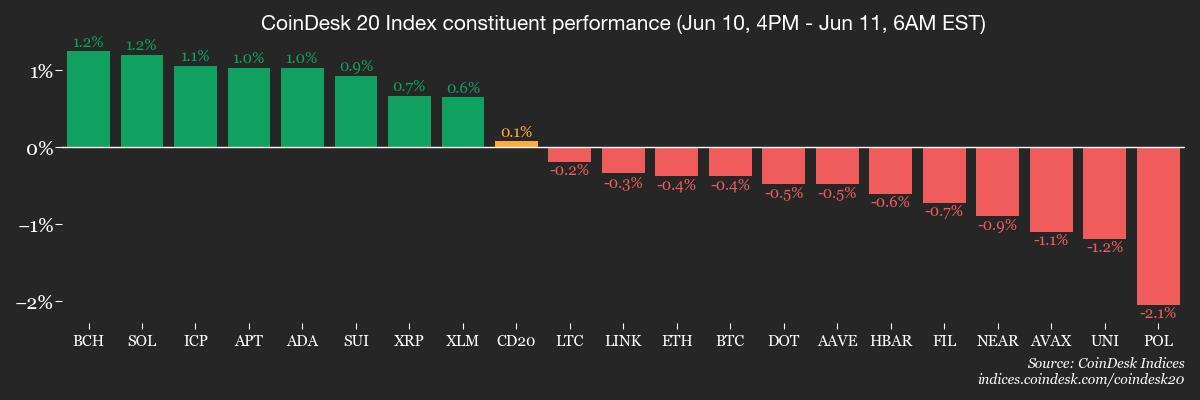
- DXY is down 0.06% at 99.03
- Gold futures are up 0.37% at $3,355.80
- Silver futures are down 0.58% at $36.43
- Nikkei 225 closed up 0.55% at 38,421.19
- Hang Seng closed up 0.84% at 24,366.94
- FTSE is little changed at 8,857.58
- Euro Stoxx 50 is little changed at 5,419.20
- DJIA closed on Tuesday up 0.25% at 42,866.87
- S&P 500 closed up 0.55% at 6,038.81
- Nasdaq Composite closed up 0.63% at 19,714.99
- S&P/TSX Composite closed up 0.19% at 26,426.31
- S&P 40 Latin America closed up 0.52% at 2,588.16
- U.S. 10-Year Treasury rate is up 2 bls at 4.5%
- E-mini S&P 500 futures are down 0.19% at 6,033.75
- E-mini Nasdaq-100 futures are down 0.17% at 21,925.25
- E-mini Dow Jones Industrial Average Index are down 0.19% at 42,829.00
Bitcoin Stats
- BTC Dominance: 64.03 (-0.07%)
- Ethereum to bitcoin ratio: 0.02531 (-0.90%)
- Hashrate (seven-day moving average): 900 EH/s
- Hashprice (spot): $54.6
- Total Fees: 5.34 BTC / $585,384
- CME Futures Open Interest: 151,010 BTC
- BTC priced in gold: 32.6 oz
- BTC vs gold market cap: 9.24%
Technical Analysis
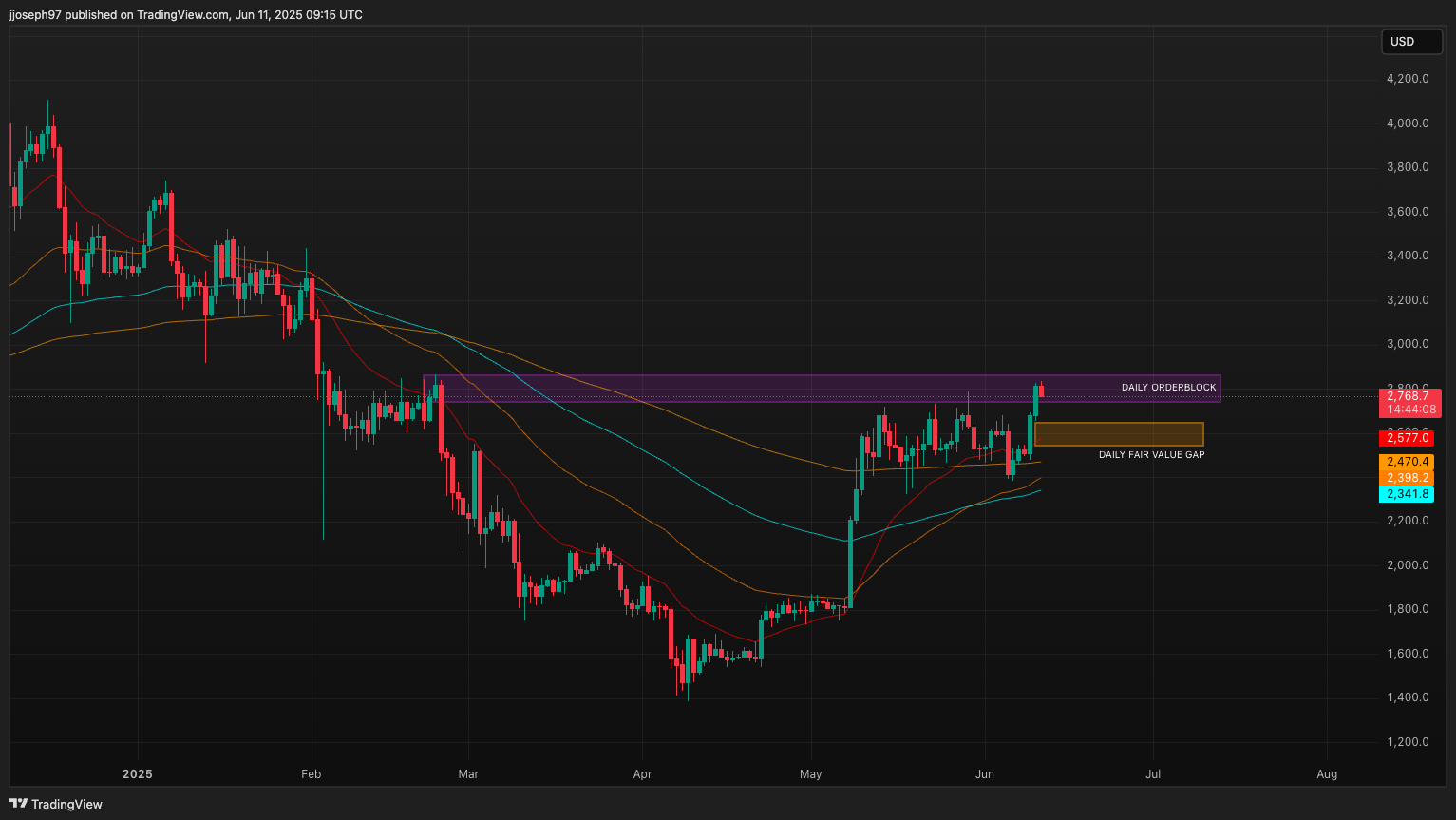
- Ethereum remains the strongest performer among the BTC, ETH and SOL trio, closing above range highs after breaking through the $2,800 level yesterday.
- The price is still trading in the daily orderblock of supply, which has capped the price since May.
- A healthy pullback could see price revisit the daily fair value gap around $2,650 — an area that bulls will likely eye for a potential higher low, especially with the U.S. CPI data on deck later today.
Crypto Equities
- Strategy (MSTR): closed on Tuesday at $391.18 (-0.24%), -0.81% at $388 in pre-market
- Coinbase Global (COIN): closed at $254.94 (-0.66%), unchanged in pre-market
- Circle (CRCL): closed at $105.91 (-8.1%), +2.17% at $108.01
- Galaxy Digital Holdings (GLXY): closed at C$27.35 (-4.3%)
- MARA Holdings (MARA): closed at $16.49 (+1.35%), 0.3% at $16.44
- Riot Platforms (RIOT): closed at $10.45 (+3.26%), -0.1% at $10.44
- Core Scientific (CORZ): closed at $12.77 (+0.47%), -1.8% at $12.54
- CleanSpark (CLSK): closed at $10.13 (+0.1%), -0.3% at $10.10
- CoinShares Valkyrie Bitcoin Miners ETF (WGMI): closed at $20.28 (+0.6%)
- Semler Scientific (SMLR): closed at $31.5 (-7.33%)
- Exodus Movement (EXOD): closed at $33.75 (+16.34%), unchanged in pre-market
ETF Flows
Spot BTC ETFs
- Daily net flow: $431.2 million
- Cumulative net flows: $45.04 billion
- Total BTC holdings ~ 1.20 million
Spot ETH ETFs
- Daily net flow: $125 million
- Cumulative net flows: $3.52 billion
- Total ETH holdings ~ 3.79 million
Source: Farside Investors
Overnight Flows
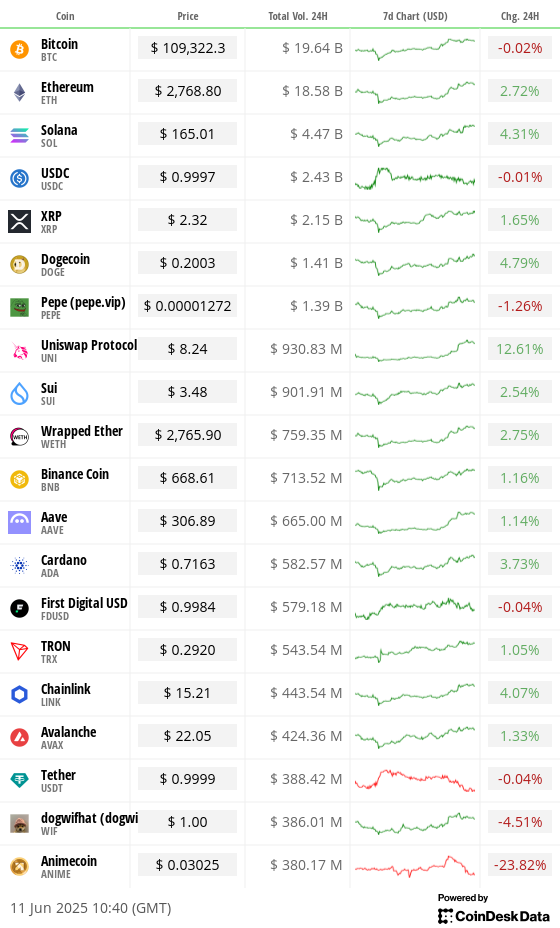
Chart of the Day
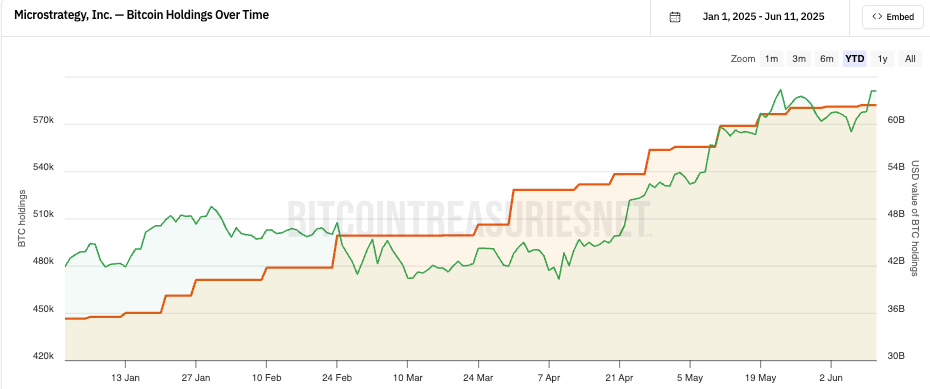
- Strategy (MSTR) added 1,045 BTC to its holdings earlier this week, increasing its treasury holdings to 582,000 BTC.
While You Were Sleeping
- U.S. and China Agree to Resume Trade Truce After Tensions Escalated (The New York Times): A framework to be presented Wednesday to Trump and Xi restores China’s exports of rare earth minerals and magnets to the U.S., resolving a key dispute in recent trade talks.
- US Marines Arrive in LA; California Governor Warns ‘Democracy Under Assault’ (Reuters): Marines are positioned near Los Angeles awaiting potential deployment amid Trump’s immigration crackdown. The mayor imposed a multi-day downtown curfew from 8 p.m. to 6 a.m. after business looting.
- Peter Thiel-Backed Crypto Group Bullish Files for Wall Street IPO (Financial Times): Bullish confidentially filed for a U.S. IPO to tap Trump-era crypto tailwinds, with Jefferies named as the lead underwriter.
- XRP Ledger’s Ethereum-Compatible Sidechain to Go Live in Q2 (CoinDesk): Peersyst Technologies says the XRPL EVM sidechain testnet, launched earlier this year, is growing rapidly. Once the sidechain launches on mainnet, it could enable users to earn yield via DeFi applications.
- Appeals Court Keeps Trump’s Sweeping Tariffs in Place for Now (The Wall Street Journal): The U.S. Court of Appeals paused a federal trade court’s ruling striking down Trump’s tariffs and scheduled full arguments for July 31.
- Dollar Divorce? Asia’s Shift Away From the U.S. Dollar Is Picking Up Pace (CNBC): Sanctions risk, trade policy unpredictability and a weakening dollar are accelerating de-dollarization as the Association of Southeast Asian Nations pledges to expand local currency use in regional trade and investment.
In the Ether
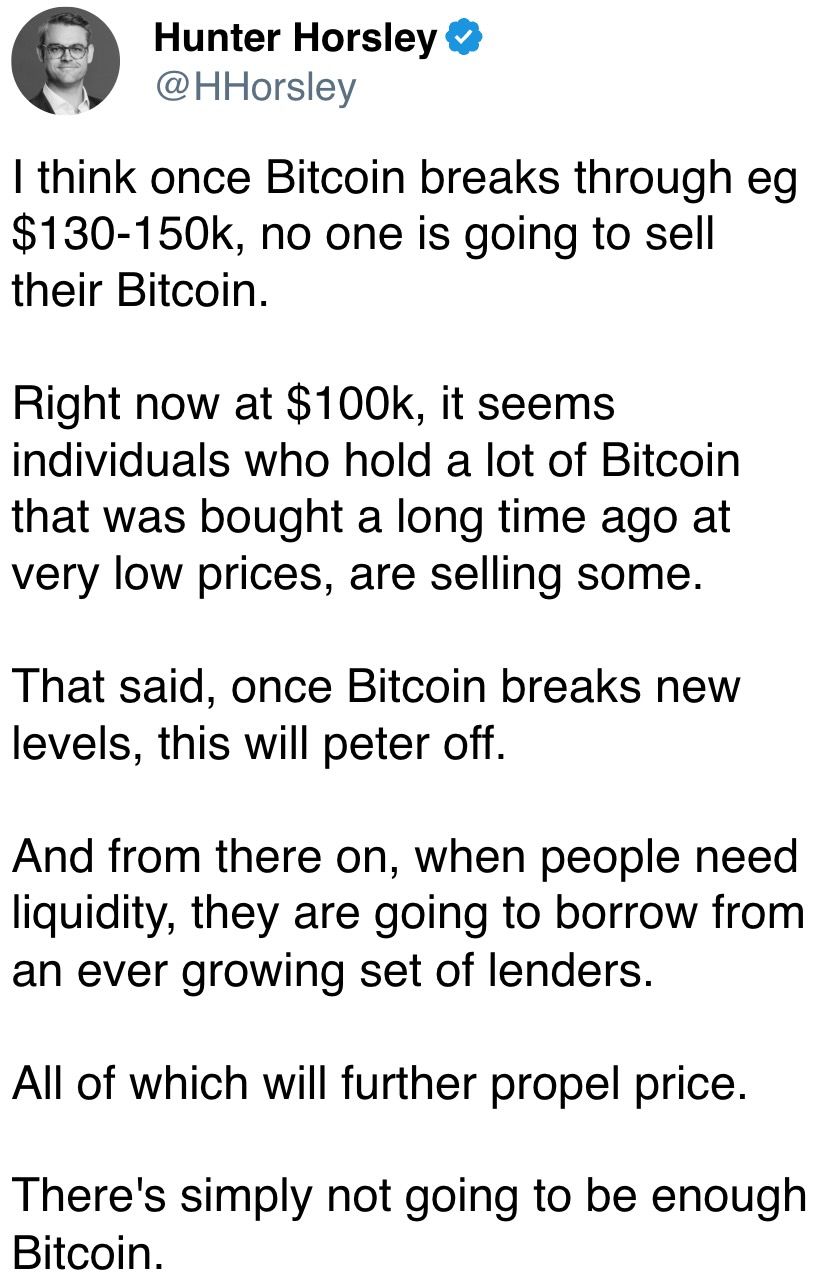
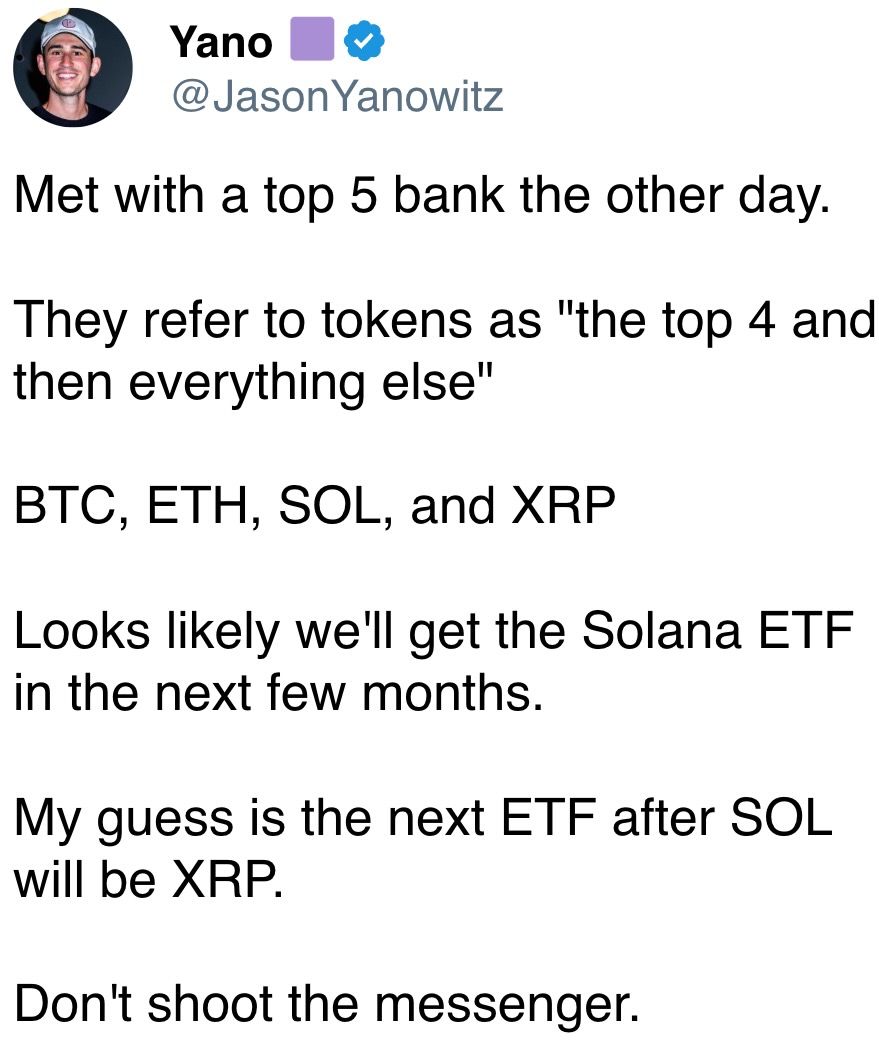
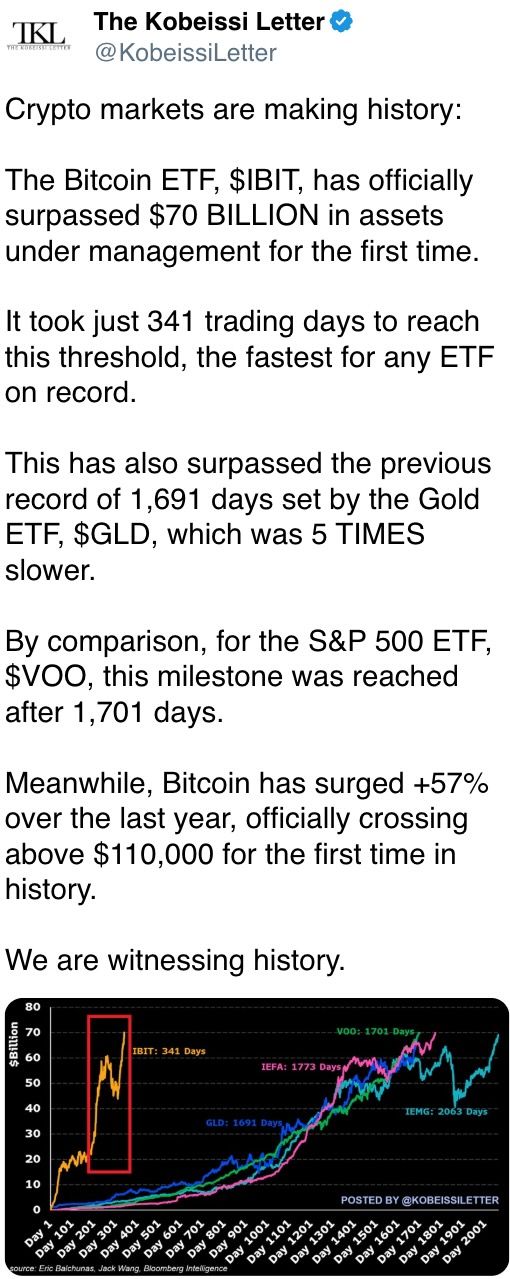
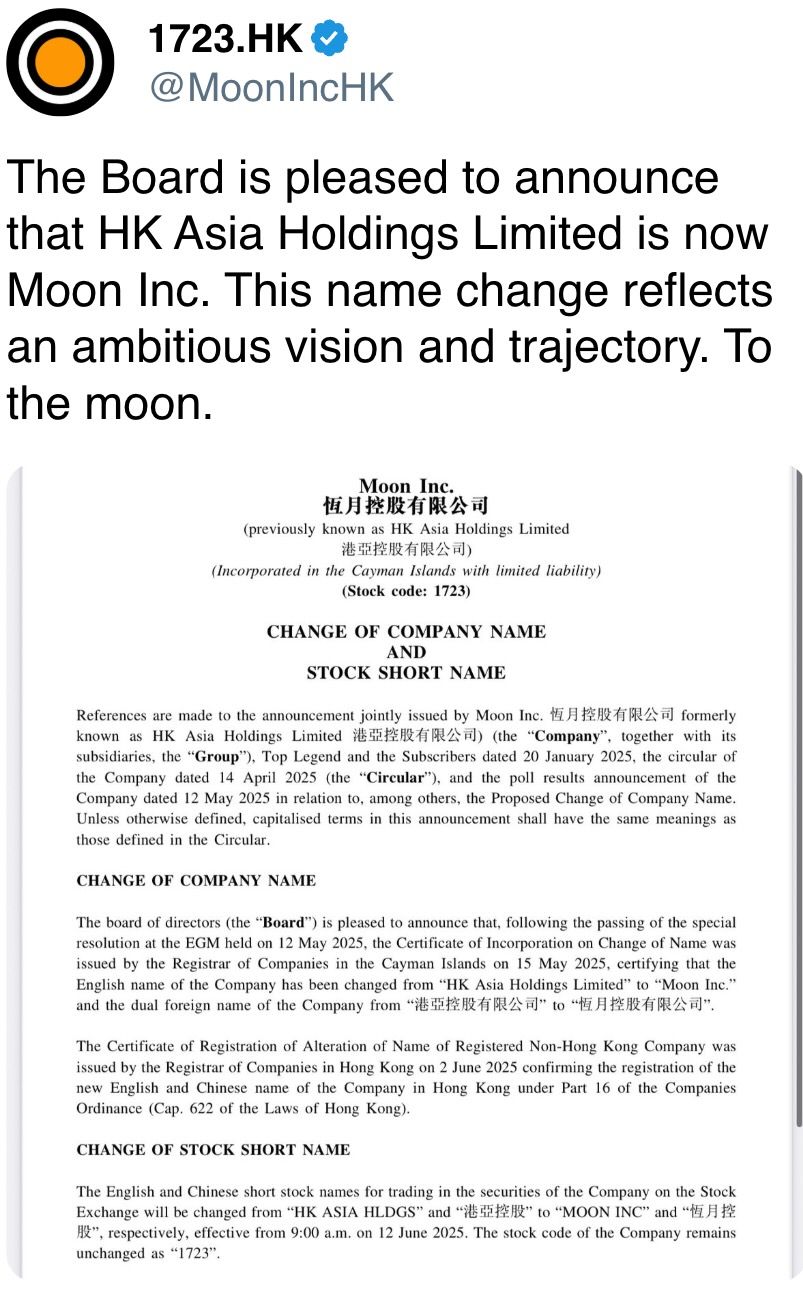
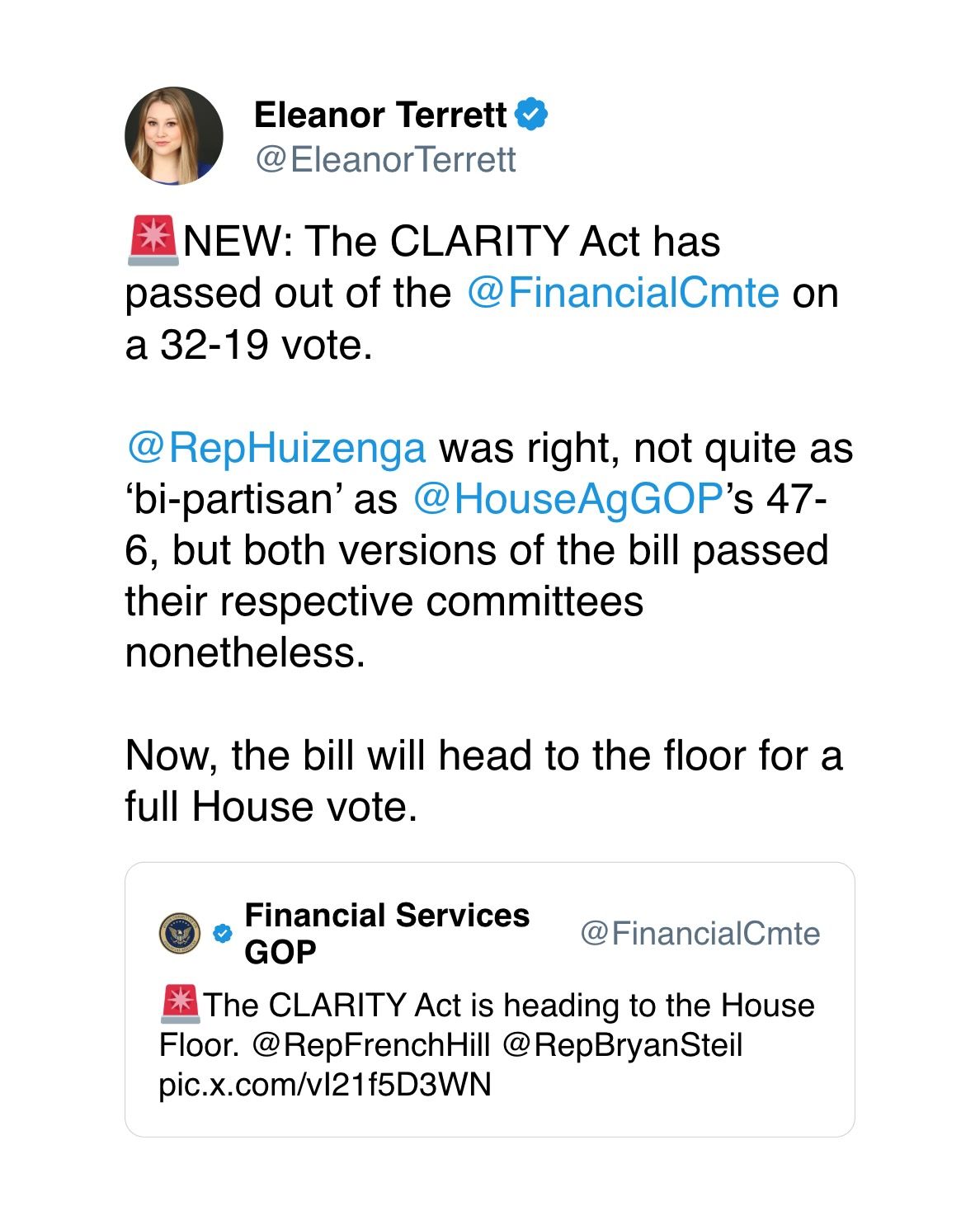
Business
Crypto Trading Firm Keyrock Buys Luxembourg’s Turing Capital in Asset Management Push

Crypto trading firm Keyrock said it’s expanding into asset and wealth management by acquiring Turing Capital, a Luxembourg-registered alternative investment fund manager.
The deal, announced on Tuesday, marks the launch of Keyrock’s Asset and Wealth Management division, a new business unit dedicated to institutional clients and private investors.
Keyrock, founded in Brussels, Belgium and best known for its work in market making, options and OTC trading, said it will fold Turing Capital’s investment strategies and Luxembourg fund management structure into its wider platform. The division will be led by Turing Capital co-founder Jorge Schnura, who joins Keyrock’s executive committee as president of the unit.
The company said the expansion will allow it to provide services across the full lifecycle of digital assets, from liquidity provision to long-term investment strategies. «In the near future, all assets will live onchain,» Schnura said, noting that the merger positions the group to capture opportunities as traditional financial products migrate to blockchain rails.
Keyrock has also applied for regulatory approval under the EU’s crypto framework MiCA through a filing with Liechtenstein’s financial regulator. If approved, the firm plans to offer portfolio management and advisory services, aiming to compete directly with traditional asset managers as well as crypto-native players.
«Today’s launch sets the stage for our longer-term ambition: bringing asset management on-chain in a way that truly meets institutional standards,» Keyrock CSO Juan David Mendieta said in a statement.
Read more: Stablecoin Payments Projected to Top $1T Annually by 2030, Market Maker Keyrock Says
Business
Crypto Trading Firm Keyrock Buys Luxembourg’s Turing Capital in Asset Management Push

Crypto trading firm Keyrock said it’s expanding into asset and wealth management by acquiring Turing Capital, a Luxembourg-registered alternative investment fund manager.
The deal, announced on Tuesday, marks the launch of Keyrock’s Asset and Wealth Management division, a new business unit dedicated to institutional clients and private investors.
Keyrock, founded in Brussels, Belgium and best known for its work in market making, options and OTC trading, said it will fold Turing Capital’s investment strategies and Luxembourg fund management structure into its wider platform. The division will be led by Turing Capital co-founder Jorge Schnura, who joins Keyrock’s executive committee as president of the unit.
The company said the expansion will allow it to provide services across the full lifecycle of digital assets, from liquidity provision to long-term investment strategies. «In the near future, all assets will live onchain,» Schnura said, noting that the merger positions the group to capture opportunities as traditional financial products migrate to blockchain rails.
Keyrock has also applied for regulatory approval under the EU’s crypto framework MiCA through a filing with Liechtenstein’s financial regulator. If approved, the firm plans to offer portfolio management and advisory services, aiming to compete directly with traditional asset managers as well as crypto-native players.
«Today’s launch sets the stage for our longer-term ambition: bringing asset management on-chain in a way that truly meets institutional standards,» Keyrock CSO Juan David Mendieta said in a statement.
Read more: Stablecoin Payments Projected to Top $1T Annually by 2030, Market Maker Keyrock Says
Business
Gemini Shares Slide 6%, Extending Post-IPO Slump to 24%

Gemini Space Station (GEMI), the crypto exchange founded by Cameron and Tyler Winklevoss, has seen its shares tumble by more than 20% since listing on the Nasdaq last Friday.
The stock is down around 6% on Tuesday, trading at $30.42, and has dropped nearly 24% over the past week. The sharp decline follows an initial surge after the company raised $425 million in its IPO, pricing shares at $28 and valuing the firm at $3.3 billion before trading began.
On its first day, GEMI spiked to $45.89 before closing at $32 — a 14% premium to its offer price. But since hitting that high, shares have plunged more than 34%, erasing most of the early enthusiasm from public market investors.
The broader crypto equity market has remained more stable. Coinbase (COIN), the largest U.S. crypto exchange, is flat over the past week. Robinhood (HOOD), which derives part of its revenue from crypto, is down 3%. Token issuer Circle (CRCL), on the other hand, is up 13% over the same period.
Part of the pressure on Gemini’s stock may stem from its financials. The company posted a $283 million net loss in the first half of 2025, following a $159 million loss in all of 2024. Despite raising fresh capital, the numbers suggest the business is still far from turning a profit.
Compass Point analyst Ed Engel noted that GEMI is currently trading at 26 times its annualized first-half revenue. That multiple — often used to gauge whether a stock is expensive — means investors are paying 26 dollars for every dollar the company is expected to generate in sales this year. For a loss-making company in a volatile sector, that’s a steep price, and could be fueling investor skepticism.
-

 Business11 месяцев ago
Business11 месяцев ago3 Ways to make your business presentation more relatable
-

 Fashion11 месяцев ago
Fashion11 месяцев agoAccording to Dior Couture, this taboo fashion accessory is back
-

 Entertainment11 месяцев ago
Entertainment11 месяцев ago10 Artists who retired from music and made a comeback
-

 Entertainment11 месяцев ago
Entertainment11 месяцев ago\’Better Call Saul\’ has been renewed for a fourth season
-

 Entertainment11 месяцев ago
Entertainment11 месяцев agoNew Season 8 Walking Dead trailer flashes forward in time
-

 Business11 месяцев ago
Business11 месяцев ago15 Habits that could be hurting your business relationships
-

 Entertainment11 месяцев ago
Entertainment11 месяцев agoMeet Superman\’s grandfather in new trailer for Krypton
-

 Entertainment11 месяцев ago
Entertainment11 месяцев agoDisney\’s live-action Aladdin finally finds its stars




